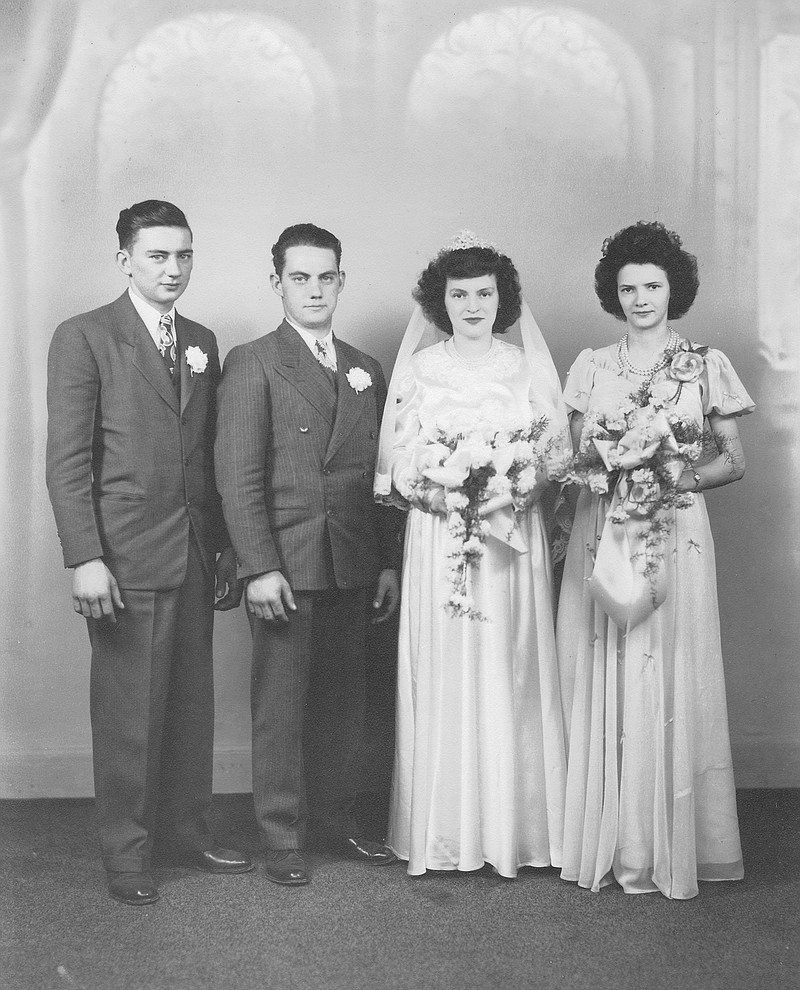Louis Boehmer was not yet 3 years old when his mother passed away in 1929. Years later, he joined his three brothers and two sisters in helping their father work the family farm near Rich Fountain, watching as one of his older brothers, Stephen, was drafted into the U.S. Army, later deploying overseas and writing home about his experiences in Italy.
On Jan. 17, 1944, an 18-year-old Boehmer traveled to the courthouse in Linn to register for the draft. Nine days later, his brother Stephen drowned off the coast of Italy after the military vessel he was aboard hit a mine. The family had little time to mourn his loss since Sylvester - Louis' other older brother - received his draft notice in December 1944 and went on to serve in Guam with the U.S. Navy.
"In papers that I have," said Betty Dickneite, one of Louis Boehmer's daughters, "it indicates that our father was scheduled to report for his pre-induction military physical at the Linn County Courthouse on Jan. 4, 1945."
While his older brother continued to serve in the U.S. Navy, Louis Boehmer was inducted into the U.S. Army at Jefferson Barracks on April 19, 1945, leaving only one of the four Boehmer brothers, Andrew, back home.
Dickneite went on to explain, "My father was first sent to Camp Livingston in Louisiana, where he completed his basic infantry training, followed by the instruction to become a military policeman with Company A, 140th Battalion of the 35th Regiment."
Named in honor of Chancellor Robert R. Livingston, the individual who negotiated the Louisiana Purchase in 1803, Camp Livingston became an infantry replacement training center during World War II and was the site of training for more than 500,000 troops on its sprawling 47,000 acres.
Spending a little more than five months at the Louisiana post, World War II ended approximately a month before Boehmer received orders to deploy to Japan to serve as a military policeman with the occupational forces. Shortly after his arrival overseas in late October 1945, he was assigned to the 237th Military Police Battalion.
As an article from the National World War II Museum explained, "The military occupation of Japan by the Allied Powers lasted from 1945-1952. Supposedly a joint occupation by international powers, it was primarily carried out by U.S. forces under the command of General Douglas MacArthur."
During this transitional and uncertain post-war period, a strong military presence was maintained while trials were conducted for Japanese leaders of the war followed by the demolition of factories that had produced weapons and munitions for the war effort.
"Documents in my father's military records show that he served for six months in the Asiatic-Pacific Theater," said Bonnie Higdon, another of the veteran's daughters. "They also note that part of his duties were patrolling roads and assisting in enforcing military rules and regulations governing traffic and military personnel."
His daughter went on to explain that their father was also responsible for performing a host of additional law enforcement activities including assisting the civilian police in maintaining order, apprehending law breakers and receiving and escorting prisoners to their places of confinement.
While in Japan, Boehmer's father fell ill and the soldier was unable to return home prior to his passing from colon cancer on Feb. 5, 1946. However, he was eventually transferred back to the United States in mid-March 1946 but had to remain in the Army until receiving his discharge Oct. 23, 1946, at Ft. Riley, Kansas.
By the time he received his discharge from the Army, Boehmer's older brother, Sylvester, was already out of the Navy but their youngest brother, Andrew, had received his draft notice and was inducted into the U.S. Army in July 1946.
"He and my mother, Marie Elizabeth Haller, were married in February 1948," said Dickneite, when speaking about her father. "I'm sure they knew one another before the war because they didn't grow up too far apart."
In the years following his overseas service, Boehmer and his wife settled in Freeburg and went on to raise three daughters. He was later employed by Quaker Windows & Doors, becoming a foreman for the company. Sadly, the 50-year-old veteran died from a massive heart attack on Aug. 11, 1976, and was laid to rest in Holy Family Cemetery in Freeburg.
Dickneite explained that although her father was hesitant to share many details about the time he spent with the U.S. Army in post-war Japan, he remained proud of his military police service and, like many veterans, maintained a collection of mementos to remind him of those experiences.
"He was a member of the American Legion and my mom was a member of the auxiliary," Dickneite said. "Although he never talked about it - it just wasn't something he discussed around the house - he had pictures from his Army days hanging on the front wall of the living room."
She added, "We didn't fully realize how important it was to him until years later when we decided to do a little redecorating and took the pictures off the wall and put them in the box in the shed." With somber pause, she concluded, "Although he never said anything to us about it, we could sense how much that collection of military items meant to him."
Jeremy P. Amick writes on behalf of the Silver Star Families of America.

